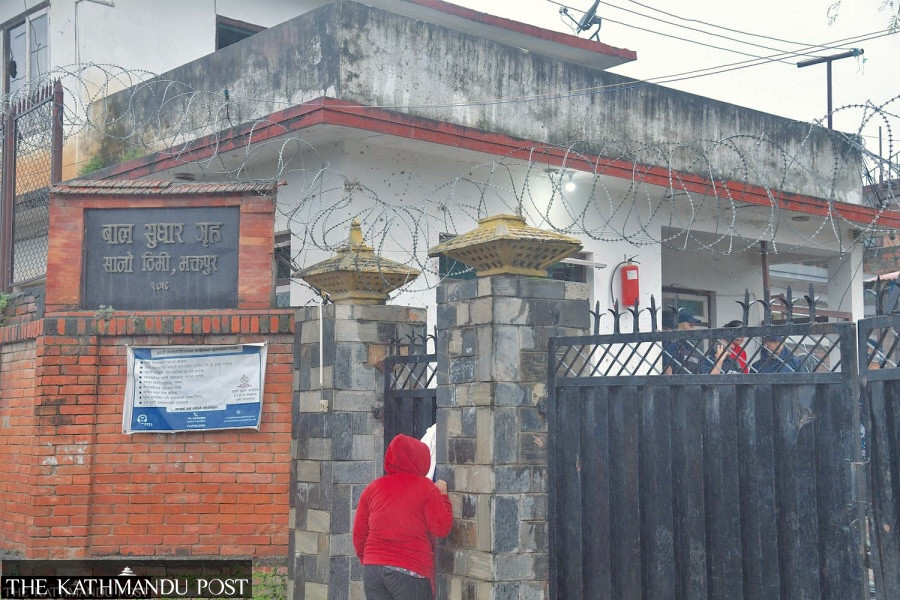National
Juvenile correction centres fail in their mission
The facilities aimed at bringing about changes in the attitudes and behaviour of the children who commit crimes are unable to provide the needed support.
Post Report
The juvenile correction centres in the country have failed to serve their purposes, study reports say.
Presenting their reports to the Law, Justice and Human Rights Committee of the House of Representatives on Sunday, three sub-panels stated that the juvenile correction centres are overcrowded, they lack basic amenities and have safety issues. The three subcommittees of the House were deployed to Koshi, Madhesh and Lumbini provinces to study the juvenile correction centres, along with prisons, there.
After studying three out of nine correction centres, all the parliamentary subcommittees had similar findings that they lack facilities even for education, health, hygiene, rest, sports and psychological counselling. Similarly, they host inmates more than four times their capacity.
Against its capacity for 50 inmates, the juvenile correction centre in Biratnagar has 222. Similarly, 117 inmates have been crammed into the Birgunj-based correction centre while it has the capacity for just 17. In Banke, 240 juvenile delinquents are housed in a centre with the maximum holding capacity for 190.
“The situation of the child correction centres is worrisome. They cannot be called correction centres,” said Gopa Labh Sapkota, who led the study team for Birgunj.
The House committee decided to carry out on-site inspection of the correction centres following one after another incident of violence there.
On July 9, at least 60 inmates fled the Jayandu Juvenile Correction Centre in Duduwa Rural Municipality of Banke district following a violent clash among themselves. The police managed to capture all but two absconders who are believed to have crossed over to India.
That was the third incident of violence in the correction centre within a year. One minor lost his life while 11 others were injured after clashes among the inmates in September last year. In another incident, a few inmates were injured following violent fights in August. As many as 275 juvenile delinquents are housed there.
On August 21 last year, 297 juvenile inmates at the Underprivileged Children’s Educational Programmes in Bhaktapur clashed with security personnel, leaving 20 police officials and 15 juvenile inmates injured. The juvenile delinquents clashed with the police after one of the minors died under mysterious circumstances.
They not only clashed with the Nepal Police and Armed Police Force personnel but as many as 221 fled the centre, breaching its gate and compound wall. Three weeks later, on September 12, inmates from a juvenile centre in Birta of Birgunj Metropolitan City clashed among themselves.
A group of inmates transferred from the juvenile centre in Sanothimi, Bhaktapur had physically assaulted their leader. Some minors from Bhaktapur were transferred to Birgunj after the clash that injured 20 security personnel and 15 juvenile inmates.
Juvenile centres house children below 18 years who are convicted or are kept in custody for their involvement in crimes.
Appearing before the House committee on Sunday, Ramesh Lekhak, the minister for home affairs, said the government was well aware of the problems in the juvenile correction centres. “We will pay proper attention to improve the situation,” he said.
A juvenile delinquent is a person under the age of 18 who commits an act that otherwise would have been charged as a crime if s/he was an adult. The minors, who commit a crime punishable by law, are kept in correction homes instead of being sent to a jail after court verdict, as per the existing law.
Those who cross 18 years of age before completing their jail terms too are kept in correction homes with the minors until they serve the set term.
The study reports have blamed the inmates who are above 18 for the violence. Over two thirds of the inmates in the centres have crossed the 18 years of age. Those stepping into adulthood were found to have been involved in attacking their juniors, said the report from Banke.
The country has eight juvenile correction centres—in Bhaktapur, Morang, Kaski, Makwanpur, Parsa, Rupandehi, Banke and Doti. These centres, tasked with bringing about changes in the attitudes and behaviour of the children who commit crimes, must follow specific criteria.
Delinquents in their mid-20's too are found to be doing their time at the centres. All the study teams have unanimously recommended their relocation.




 18.12°C Kathmandu
18.12°C Kathmandu













